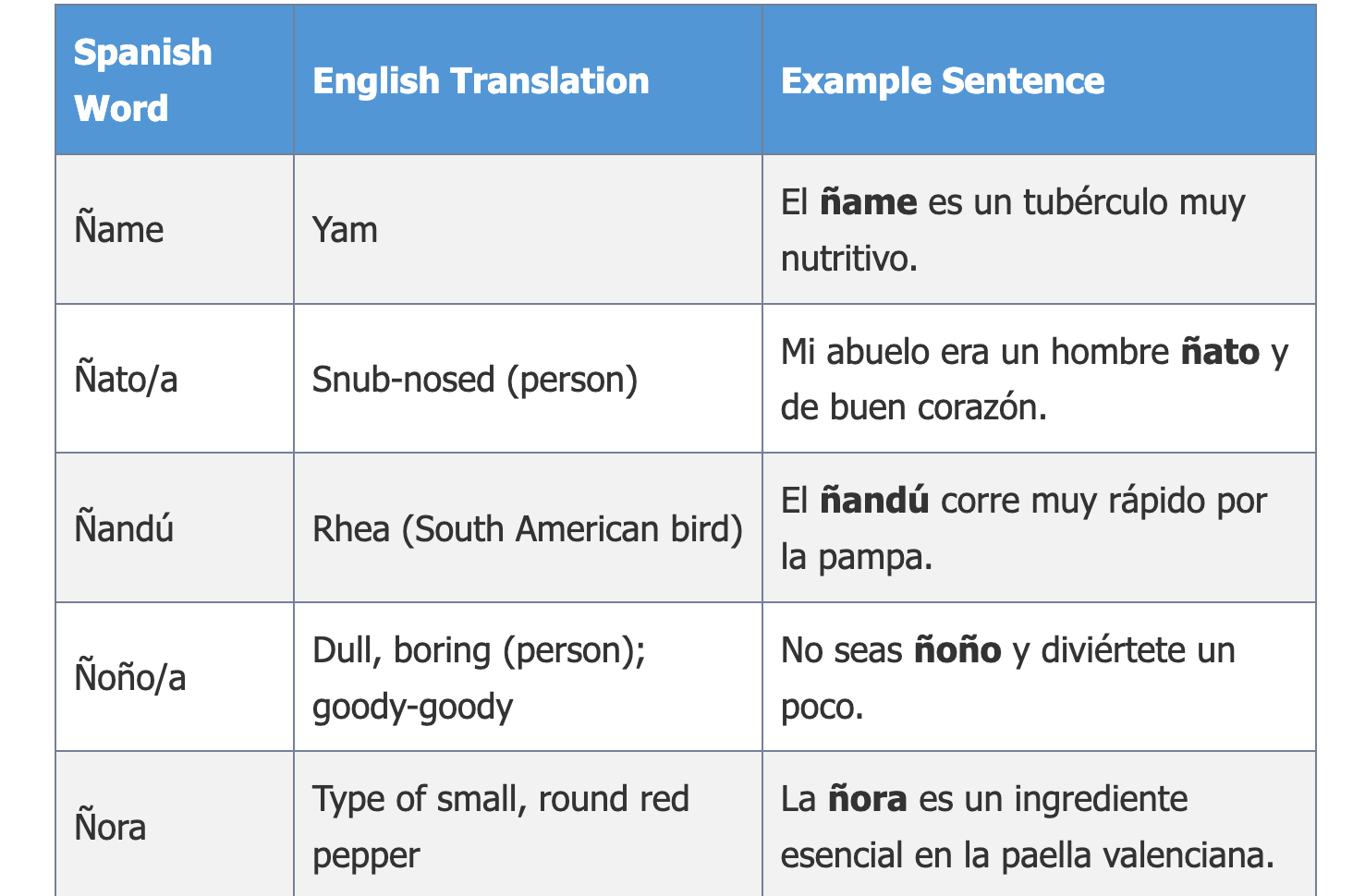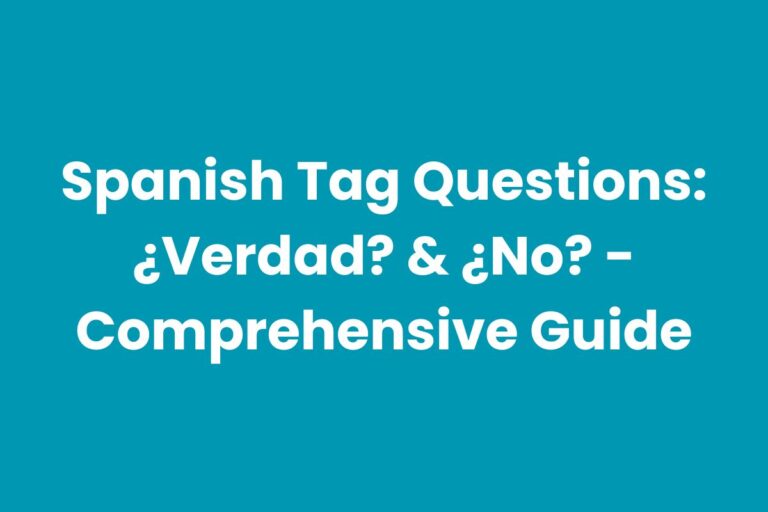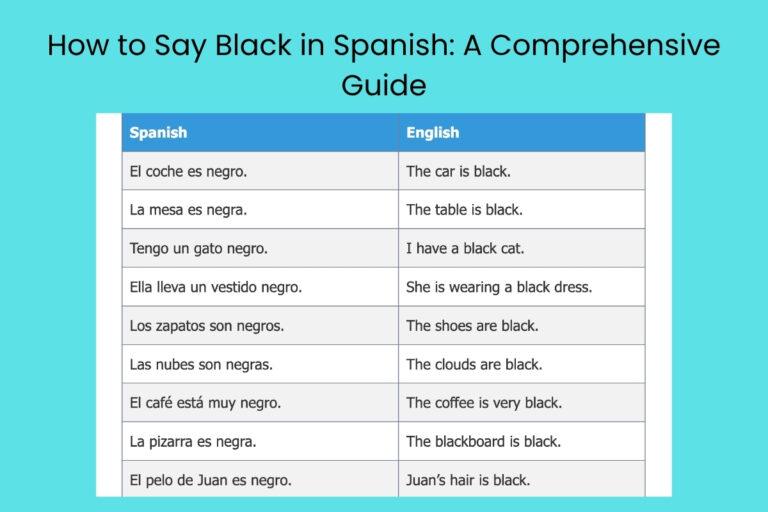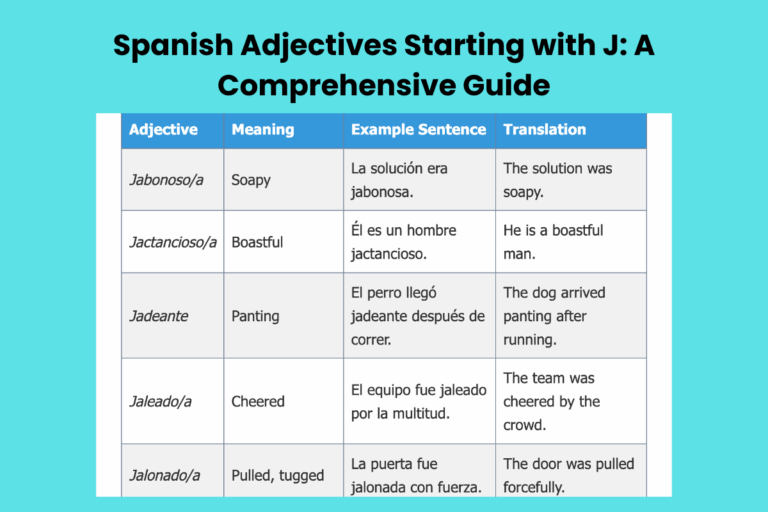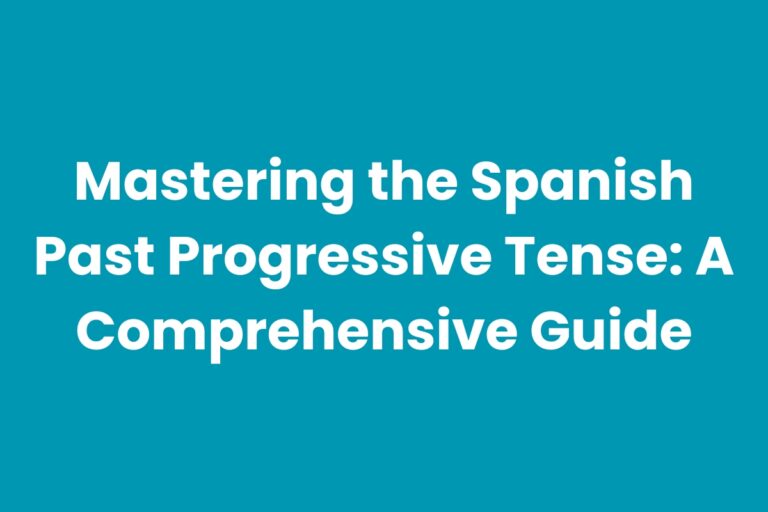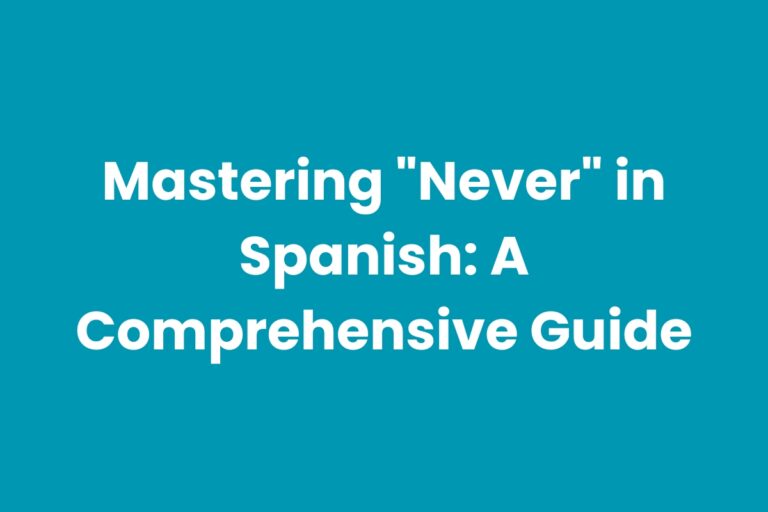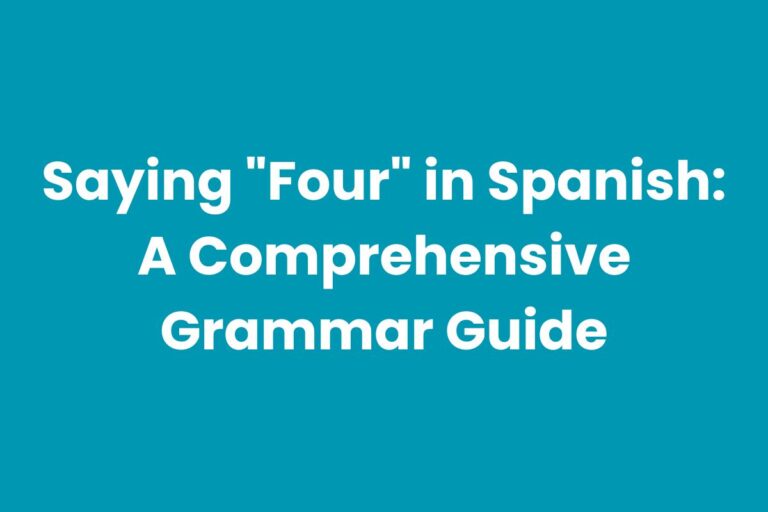Spanish Words Starting with Ñ: A Comprehensive Guide
The Spanish language, rich in history and culture, boasts a unique character: the letter “ñ.” This letter, absent in many other languages, represents a distinct sound and plays a crucial role in Spanish vocabulary. Understanding words that begin with “ñ” is essential for mastering Spanish pronunciation, comprehension, and overall fluency.
This guide is designed for Spanish learners of all levels, from beginners to advanced students, providing a detailed exploration of “ñ” words, their meanings, usage, and common pitfalls. By delving into this specific aspect of Spanish vocabulary, learners can enhance their linguistic skills and gain a deeper appreciation for the nuances of the language.
Table of Contents
- Introduction
- Definition of Ñ in Spanish
- Structural Breakdown of Words with Ñ
- Categories of Words Starting with Ñ
- Examples of Spanish Words Starting with Ñ
- Usage Rules for Words Starting with Ñ
- Common Mistakes with Ñ Words
- Practice Exercises
- Advanced Topics: Nuances and Regional Variations
- Frequently Asked Questions (FAQ)
- Conclusion
Definition of Ñ in Spanish
The letter “ñ” (pronounced “enye”) is a distinct letter in the Spanish alphabet, not simply an “n” with a tilde. The tilde (~) above the “n” indicates a palatal nasal sound, similar to the “ny” sound in the English word “canyon” or the “gn” sound in the Italian word “gnocchi.” This sound is crucial for differentiating words and conveying the correct meaning.
The “ñ” is considered a consonant, and its presence in a word significantly alters its pronunciation and definition. It’s a fundamental part of the Spanish language and culture, often seen as a symbol of Spanish identity.
The letter “ñ” originates from medieval Spanish orthography. Scribes would often write double “n” sounds as “nn.” To save space and ink, they began to abbreviate it by placing a tilde over a single “n.” Over time, this abbreviation evolved into the distinct letter we know today.
The letter “ñ” is not just a sound; it’s a cultural marker, representing the unique evolution of the Spanish language. Understanding its origin helps to appreciate its significance.
Structural Breakdown of Words with Ñ
Words starting with “ñ” follow the general rules of Spanish phonetics and morphology. Typically, the “ñ” is followed by a vowel to form a syllable.
The placement of the “ñ” at the beginning of a word immediately signals the specific sound and often indicates the word’s origin and meaning. Understanding this structural element is key to accurate pronunciation and comprehension.
The “ñ” can also be followed by consonant clusters in some, rarer instances.
Spanish words are generally constructed with a root (the core meaning) and affixes (prefixes and suffixes) that modify the meaning. While not many words start with “ñ”, understanding the structure of those that do helps in recognizing related words and their derivations.
The “ñ” itself often appears in the middle of words as well, deriving from similar root words. Analyzing the structure of these words provides insight into Spanish word formation and etymology.
Categories of Words Starting with Ñ
Although the number of Spanish words starting with “ñ” is relatively small compared to other letters, they can be categorized based on their meaning and function. These categories provide a framework for understanding the types of words that begin with this unique letter.
Recognizing these patterns aids in vocabulary acquisition and usage.
Nouns
Some words that start with “ñ” are nouns, representing people, places, things, or ideas. These nouns are fundamental to building sentences and expressing concepts.
Recognizing these nouns is crucial for basic communication.
Adjectives
Adjectives modify nouns, providing descriptive details. While less common, some adjectives start with “ñ” and are used to describe qualities or characteristics.
These adjectives add depth and nuance to descriptions.
Verbs
Verbs express actions or states of being. Although extremely rare, if a verb were to start with “ñ”, it would describe a specific action.
However, it’s crucial to remember that no commonly used Spanish verbs begin with “ñ”.
Adverbs
Adverbs modify verbs, adjectives, or other adverbs, providing information about how, when, where, or to what extent something is done. There are no adverbs that begin with “ñ” in common usage.
Examples of Spanish Words Starting with Ñ
This section provides an extensive list of Spanish words that start with “ñ,” categorized by their part of speech. Each example is presented with its English translation and a sample sentence to illustrate its usage in context.
These examples are designed to enhance understanding and provide practical application of the vocabulary.
Nouns Starting with Ñ
Nouns are the most common category of words starting with “ñ”. They represent tangible and intangible things, playing a vital role in everyday communication.
The following table provides a comprehensive list of nouns starting with “ñ”.
| Spanish Word | English Translation | Example Sentence |
|---|---|---|
| Ñame | Yam | El ñame es un tubérculo muy nutritivo. |
| Ñato/a | Snub-nosed (person) | Mi abuelo era un hombre ñato y de buen corazón. |
| Ñandú | Rhea (South American bird) | El ñandú corre muy rápido por la pampa. |
| Ñoño/a | Dull, boring (person); goody-goody | No seas ñoño y diviértete un poco. |
| Ñora | Type of small, round red pepper | La ñora es un ingrediente esencial en la paella valenciana. |
| Ñublado | Cloudy (used as a noun) | El día amaneció con un ñublado que presagiaba lluvia. |
| Ñapa | Something extra given for free; bonus | El vendedor me dio una ñapa por mi compra. |
| Ñiquiñaque | A small amount; nothing | No queda ñiquiñaque de comida en la nevera. |
| Ñengo | Weak, frail | Se siente ñengo después de la enfermedad. |
| Ñinga | A very small amount, nothing | No me importa ñinga lo que pienses. |
| Ñubosidad | Cloudiness | La ñubosidad dificulta la visibilidad en la carretera. |
| Ñácara | Imitation, something of poor quality | Esa joya es una ñácara, no vale nada. |
| Ñeque | Strength, vigor | Demuestra tu ñeque levantando esa pesa. |
| Ñorica | Little lady | La ñorica se portó muy bien en la fiesta. |
| Ñu | Gnu | El ñu es un antílope africano. |
| Ñampe | Type of wild potato | El ñampe es muy común en la cocina rural. |
| Ñángara | A person of African origin (derogatory, avoid using) | *Note: This word is deeply offensive and should never be used.* |
| Ñecla | Kind of small ant | Las ñeclas invadieron la cocina buscando comida. |
| Ñudo | Knot (in wood) | La madera tenía un ñudo que dificultaba el corte. |
| Ñáñigo | Member of a secret Afro-Cuban society | El ñáñigo participaba en rituales tradicionales. |
| Ñublina | Drizzle | Una fina ñublina cubría la ciudad. |
| Ñiquiñaque | A very small amount | No le queda ñiquiñaque de paciencia. |
| Ñipe | Child | El ñipe jugaba en el parque. |
| Ñapango | Type of tree | El ñapango da buena sombra. |
| Ñachi | Dish made of lamb blood and seasonings (Chile) | El ñachi es un plato tradicional en Chile. |
| Ñuto | Powdered potato | El ñuto se utiliza para hacer sopa. |
| Ñoclo | Young corn | El ñoclo es muy tierno y dulce. |
Adjectives Starting with Ñ
Adjectives starting with “ñ” are less frequent, but they add specific nuances to descriptions. The following table presents some common adjectives that start with “ñ”.
| Spanish Word | English Translation | Example Sentence |
|---|---|---|
| Ñato/a | Snub-nosed | El perro tiene la nariz ñata. |
| Ñoño/a | Dull, boring, goody-goody | Esa película es muy ñoña. |
| Ñublado/a | Cloudy | El cielo está ñublado hoy. |
| Ñeco/a | Maimed, incomplete | El árbol quedó ñeco después de la tormenta. |
| Ñanguito/a | Weak, sickly | El niño está ñanguito por la fiebre. |
| Ñudo/a | Knotty (wood) | La madera está ñuda y difícil de trabajar. |
| Ñato/a | Flat-nosed | Tiene la nariz ñata como su padre. |
| Ñorbo/a | Stubborn | Es una persona muy ñorba y no escucha consejos. |
| Ñuco/a | Deformed, mutilated | La planta quedó ñuca después de la helada. |
Verbs Starting with Ñ
It’s important to note that there are no commonly used verbs in the Spanish language that begin with the letter “ñ”. This is a notable exception to the typical structure of Spanish vocabulary.
While theoretically verbs could be created, none are in standard usage.
Because of the lack of verbs starting with ñ, this provides an opportunity to discuss verb conjugations. Spanish verbs are conjugated based on tense, mood, and person.
This complex system is essential for forming grammatically correct sentences. Understanding verb conjugations is one of the most challenging, yet crucial, aspects of learning Spanish.
Other Word Types Starting with Ñ
Similar to verbs, there are no commonly used adverbs, prepositions, or conjunctions that begin with the letter “ñ.” This further highlights the limited number of words in the Spanish language that start with this unique letter.
The absence of these word types starting with “ñ” underscores the unique characteristics of the Spanish lexicon. It demonstrates that not all letters are equally represented in the language’s vocabulary.
This uneven distribution is a common feature of many languages and reflects their historical development and phonetic structures.
Usage Rules for Words Starting with Ñ
The usage of words starting with “ñ” follows the standard rules of Spanish grammar. Nouns must agree in gender and number with their articles and adjectives.
Adjectives must also agree in gender and number with the nouns they modify. Understanding these agreement rules is crucial for constructing grammatically correct sentences.
For example, if you are referring to a “ñame” (yam), which is masculine, you would use the masculine article “el” (el ñame). If you are describing a “persona ñata” (snub-nosed person), the adjective “ñata” must agree in gender and number with the noun “persona.” These agreement rules apply to all Spanish words, regardless of whether they start with “ñ” or another letter.
There are no specific exceptions or special cases that apply solely to words starting with “ñ.” These words are used in the same way as other Spanish words, following the general rules of grammar and syntax. Therefore, mastering the fundamental principles of Spanish grammar is essential for using these words correctly.
Common Mistakes with Ñ Words
One common mistake is confusing the “ñ” sound with a simple “n” sound. This can lead to mispronunciation and misunderstanding.
It’s crucial to practice the “ñ” sound to differentiate it from the “n” sound. For example, pronouncing “año” (year) as “ano” (anus) can lead to embarrassing situations.
Therefore, accurate pronunciation is essential.
Another mistake is misspelling words with “ñ” by omitting the tilde. This can change the meaning of the word or render it meaningless.
Always double-check the spelling of words with “ñ” to ensure accuracy. For instance, “nina” means girl, while “niña” means girl.
Using words starting with “ñ” in inappropriate contexts can also be a mistake. Some of these words may have regional or colloquial meanings that are not widely understood.
Be mindful of the context and audience when using these words. For example, using the word “ñoño” to describe someone may be considered offensive in some situations.
Here are some examples of correct and incorrect usage:
| Incorrect | Correct | Explanation |
|---|---|---|
| Ano nuevo | Año nuevo | “Ano” means anus, while “año” means year. |
| Nina es bonita. | Niña es bonita. | “Nina” is not a word, while “niña” means girl. |
| El nandu corre rápido. | El ñandú corre rápido. | “Nandu” is an incorrect spelling of “ñandú”. |
Practice Exercises
These practice exercises are designed to reinforce your understanding of Spanish words starting with “ñ.” Each exercise focuses on different aspects of vocabulary and grammar, providing a comprehensive review of the material. The answers are provided at the end of each exercise.
Exercise 1: Fill in the Blanks
Fill in the blanks with the appropriate word starting with “ñ.”
- El _______ es un ave sudamericana.
- Mi abuelo era un hombre _______.
- El cielo está _______ hoy.
- La paella valenciana lleva _______.
- No seas _______ y diviértete.
Answers:
- Ñandú
- Ñato
- Ñublado
- Ñora
- Ñoño
Exercise 2: Translate the Sentences
Translate the following sentences into Spanish, using words starting with “ñ.”
- The yam is a nutritious tuber.
- The snub-nosed dog is very cute.
- The cloudy day makes me sad.
- He gave me a bonus for my purchase.
- That movie is very boring.
Answers:
- El ñame es un tubérculo muy nutritivo.
- El perro ñato es muy lindo.
- El día nublado me pone triste.
- Me dio una ñapa por mi compra.
- Esa película es muy ñoña.
Exercise 3: Multiple Choice
Choose the correct word starting with “ñ” to complete the sentence.
- Which word means “yam”?
- Naranja
- Ñame
- Nido
- Which word describes a snub-nosed person?
- Normal
- Ñato
- Negro
- Which word means “cloudy”?
- Soleado
- Ñublado
- Nevado
Answers:
- b
- b
- b
Exercise 4: True or False
Determine whether the following statements are true or false.
- All Spanish verbs start with “ñ.”
- “Ñandú” is a type of bird.
- “Ñoño” is a compliment.
Answers:
- False
- True
- False
Exercise 5: Sentence Completion
Complete the sentences using words that start with “ñ” and make sense in the context.
- En Argentina, se puede ver el _______ corriendo por la pampa.
- El niño es un poco _______, siempre prefiere estudiar que jugar.
- El cielo está _______, así que probablemente lloverá esta tarde.
- En algunas culturas, es común recibir una _______ al hacer una compra grande.
- Mi abuela siempre me decía: “No seas _______, disfruta de la vida”.
Answers:
- Ñandú
- Ñoño
- Ñublado
- Ñapa
- Ñoño
Advanced Topics: Nuances and Regional Variations
The usage of words starting with “ñ” can vary depending on the region. Some words may have different meanings or connotations in different countries.
For example, the word “ñoño” may have a milder connotation in some regions compared to others. Therefore, it’s important to be aware of these regional variations to avoid misunderstandings.
Furthermore, some words starting with “ñ” may have colloquial or slang meanings that are not found in standard dictionaries. These meanings are often specific to certain regions or social groups.
Understanding these colloquialisms requires immersion in the culture and familiarity with local dialects. For example, in some regions, the word “ñapa” might refer to something slightly different than a simple bonus.
Exploring the etymology of words starting with “ñ” can also provide valuable insights into their historical development and cultural significance. Tracing the origins of these words can reveal connections to other languages and cultures.
For instance, the word “ñame” has roots in African languages, reflecting the historical exchange of goods and ideas between different continents.
Frequently Asked Questions (FAQ)
- Why are there so few Spanish words starting with “ñ”?
The limited number of words starting with “ñ” is due to the historical development of the Spanish language. The “ñ” sound typically evolved from earlier consonant clusters, and these clusters were not as common at the beginning of words.
- Is the “ñ” sound difficult for English speakers to pronounce?
Yes, the “ñ” sound can be challenging for English speakers because it doesn’t exist in the English language. However, with practice and attention to the correct tongue placement, it can be mastered.
- Are there any Spanish names that start with “ñ”?
No, there are no common Spanish names that begin with the letter “ñ”. The letter is more commonly found within names rather than at the beginning.
- How important is it to pronounce the “ñ” correctly?
Pronouncing the “ñ” correctly is crucial because it can change the meaning of a word. Mispronouncing it can lead to misunderstandings and even humorous situations.
- Can I use a regular “n” instead of “ñ” in writing?
No, using a regular “n” instead of “ñ” is incorrect and can change the meaning of the word or make it meaningless. Always use the “ñ” when it is required.
- Are there any loanwords in Spanish that start with “ñ”?
No, it is highly uncommon to find loanwords in Spanish that start with the letter “ñ”. The words that begin with “ñ” are typically native to the Spanish language or have evolved within it.
- How can I practice the “ñ” sound?
You can practice the “ñ” sound by listening to native speakers and repeating words that contain the letter “ñ.” You can also use online resources and language learning apps to improve your pronunciation.
- Is the letter “ñ” used in languages other than Spanish?
The letter “ñ” is also used in other languages, such as Galician, Basque, and some indigenous languages of the Americas, though its prevalence is most strongly associated with Spanish.
- What’s the difference between “año” and “ano”?
“Año” (with ñ) means “year,” while “ano” (with n) refers to the anus. The difference in meaning is significant, so correct pronunciation is essential.
- Where does the “ñ” come from?
The “ñ” evolved from the medieval practice of writing a double “n” (nn) sound. Scribes would place a tilde over a single “n” to indicate the double “n” sound, which eventually became the distinct letter “ñ.”
Conclusion
Understanding Spanish words starting with “ñ” is a crucial aspect of mastering the Spanish language. While the number of these words is relatively small, their correct pronunciation and usage are essential for effective communication.
This guide has provided a comprehensive overview of “ñ” words, their meanings, usage rules, and common mistakes. By studying these words and practicing their pronunciation, Spanish learners can enhance their vocabulary and improve their overall fluency.
Remember to pay attention to regional variations and colloquial meanings, and always double-check the spelling of words with “ñ.” With consistent practice and a keen ear for pronunciation, you can confidently use these unique words in your everyday Spanish conversations. Embrace the challenges and enjoy the journey of learning this beautiful and expressive language.
Continue to explore new vocabulary and refine your grammar skills to achieve fluency and mastery of Spanish.

